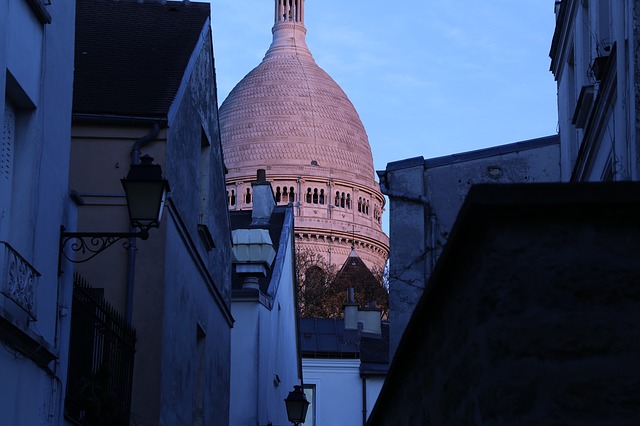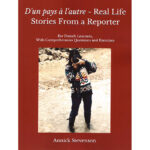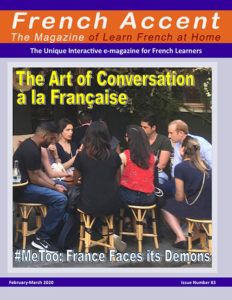Who has not been confused over the difference between jour vs journée, soir vs soirée and an vs année? The reasons for using one or the other can be complicated, therefore, I would like to give an easy and straight forward explanation. The idea is to avoid thinking too much about it when speaking to a French person.
In a nutshell, you should use the shorter version: jour, soir and an when you’re talking about a number of jours, etc., which means that there will be a number placed in front or after the word. However, when you are adding Descriptive words (such as Interrogative words, indefinite Adjectives or certain Prepositions), then you will mainly use the longer version with the suffix “ée” or “née”: journée, soirée and année. Let’s shine some light on things with examples:
1) Expressing numbers:
‒Age
J’ai 30 ans. = I am 30 years old.
Ce bébé a 8 jours. = This baby is 8 days old.
‒Time spent
Il est parti pendant 15 jours. = He left for 15 days.
Nous avons terminé notre projet en 5 jours. = We finished our project in 5 days.
J’ai mangé le même gâteau 3 soirs de suite. = I ate the same cake 3 evenings in a row.
‒A number of days and years ago
Ils se sont mariés il y a 30 ans. = They got married 30 years ago.
Je suis parti des Etats‐Unis il y a 10 jours. = I left the USA 10 days ago.
EXCEPTION: When using ordinals numerals such as first, second, third, etc., you need to add the suffix “née”:
C’est ma deuxième année dans mon nouveau poste. = It’s my second year in my new job
2) Using descriptive words, Adjectives, prepositions:
First let’s clarify a few terms:
Demonstrative Adjectives = words such as ce, celle, ces (this, these);
Interrogative Adjectives = words such as quel, quelle (what), combien (how many);
Prepositions: words such as pour (for), dans (in), avant (before), après (after), etc.
Again, in short, with adjectives in general, you will most of the time use the longer version.
‒Descriptive adjectives
Examples:
Aujourd’hui, c’est une belle journée. = Today, it’s a beautiful day.
La veille de mon anniversaire a été une mauvaise soirée. = The evening before my birthday was a bad evening.
In these cases, belle and mauvaise are Adjectives and they trigger jour to become journée, and soir to become soirée.
NOTE: You’ve also probably heard Bonne journée et Bonne soirée to say “Have a nice day” and “Have a nice evening”? This is another example of how the Adjective bonne calls for the use of “ée” or “née”.
Other examples:
L’année prochaine sera une année intéressante. = Next year will be an Interesting year.
Je l’ai vu au bar pendant plusieurs soirées. = I saw him at the bar during several evenings.
‒Demonstrative Adjectives
Examples:
Je vais en Allemagne cette année. = I’m going to Germany this year.
L’année 2015 ? J’ai beaucoup travaillé cette année‐là. = The year 2015? I worked a lot that year.
NOTE: At times it is possible to say ce‐jour là and quel jour. It really depends on the Situation. Examples: J’étais vraiment fatigué ce jour‐ là. = I was really tired that day.
Quel jour pars‐tu pour Los Angeles ? = Which day are you leaving for Los Angeles?
‒Interrogative adjectives
Examples:
Tu pars pour combien d’années en Afrique ? = You’re leaving for how many years in Africa?
Quelle journée as‐tu préféré pendant l’atelier ? = Which day did you prefer during the workshop?
NOTE: When quelle is an exclamation, is it also followed by the long form.
Examples: Quelle belle soirée ! = What a beautiful evening!
Quelle année ! = What a year!





 Improve your French aural comprehension, your French writing skills or your grammar knowledge. Communicate with ease and confidence when traveling in France… Our ebooks have helped thousand of French learners. Ebooks with audio, exercices, short stories, etc.
Improve your French aural comprehension, your French writing skills or your grammar knowledge. Communicate with ease and confidence when traveling in France… Our ebooks have helped thousand of French learners. Ebooks with audio, exercices, short stories, etc. Receive our French Learning e-Magazine for FREE!
Receive our French Learning e-Magazine for FREE!